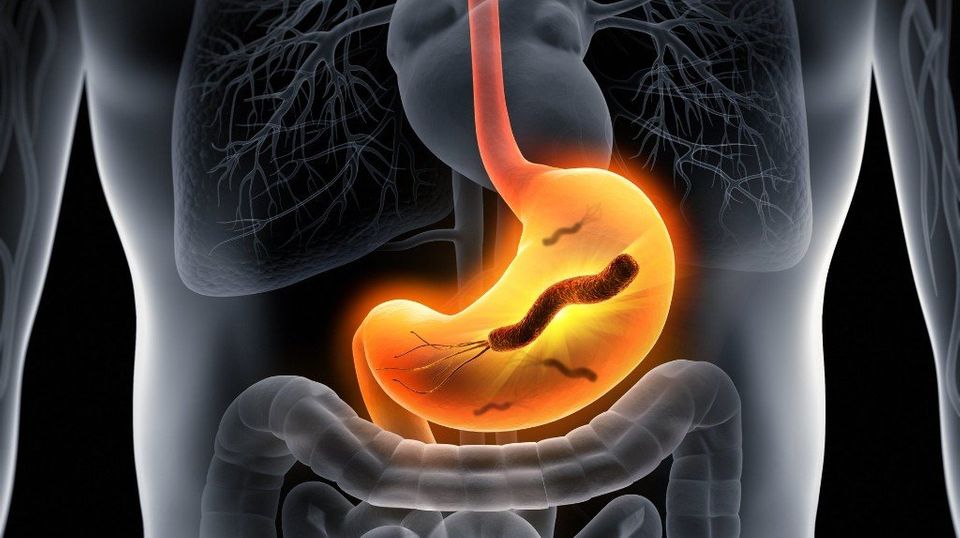
Nội dung bài viết / Table of Contents
This post is also available in: Tiếng Việt (Vietnamese)

H. pylori infection is a condition occurs when a type of bacteria called Helicobacter pylori (H. pylori) infects your stomach. This usually happens during childhood. A common cause of peptic ulcers, H. pylori infection may be present in more than half the people in the world.
Most people don’t realize they have H. pylori infection, because they never get sick from it. If you develop signs and symptoms of a peptic ulcer, your doctor will probably test you for H. pylori infection, because it can be treated with antibiotics.
Infection with H. pylori is common. About two-thirds of the world’s population has it in their bodies. For most people, it doesn’t cause ulcers or any other symptoms. If you do have problems, there are medicines that can kill the germs and help sores heal.
However, it can be managed by reducing your risk factors. Please discuss with your doctor for further information.
It is noticed that most people with H. pylori infection will never have any signs or symptoms. It’s not obvious why this is, but some people may be born with more resistance to the harmful effects of H. pylori.
When signs or symptoms do occur with H. pylori infection, they may include:
If you have any signs or symptoms listed above or have any questions, please consulting with your doctor. Everyone’s body acts differently. It is always best to discuss with your doctor what is best for your situation.
Until now it’s still not known exactly how H. pylori infections spread. The bacteria have coexisted with humans for many thousands of years. In addition, the infections are thought to spread from one person’s mouth to another. They may also be transferred from feces to the mouth. This can happen when a person does not wash their hands thoroughly after using the bathroom. H. pylori can also spread through contact with contaminated water or food.
The bacteria are believed to cause stomach problems when they penetrate the stomach’s mucous lining and generate substances that neutralize stomach acids. This makes the stomach cells more vulnerable to the harsh acids. Stomach acid and H. pylori together irritate the stomach lining and may cause sores or peptic ulcers in your stomach or duodenum, which is the first part of your small intestine.
There are many risk factors for Helicobacter pylori infection, such as:
Living in crowded conditions
You have a greater risk of H. pylori infection if you live in a home with many other people.
Living without a reliable supply of clean water
Having a reliable supply of clean, running water helps reduce the risk of H. pylori.
Living in a developing country
People living in developing countries, where crowded and unsanitary living conditions may be more common, have a higher risk of H. pylori infection.
Living with someone who has an H. pylori infection
If someone you live with has H. pylori, you’re more likely to also have H. pylori.
The information provided is not a substitute for any medical advice. ALWAYS consult with your doctor for more information.
If your doctor suspects that you may experience this condition, a physical examination will be performed and some tests will be also recommended by your doctor. Some common tests may be ordered include:
Blood test
Analysis of a blood sample may reveal evidence of an active or previous H. pylori infection in your body. However, breath and stool tests are better at detecting active H. pylori infections than is a blood test.
Breath test
During a breath test, you swallow a pill, liquid or pudding that contains tagged carbon molecules. If you have an H. pylori infection, carbon is released when the solution is broken down in your stomach. Your body absorbs the carbon and expels it when you exhale. You exhale into a bag, and your doctor uses a special device to detect the carbon molecules.
Stool test
A laboratory test called a stool antigen test looks for foreign proteins (antigens) associated with H. pylori infection in your stool. As with the breath test, PPIs and bismuth subsalicylate can affect the results of this test, so your doctor will ask you to stop taking them for two weeks before the test.
Scope test
You’ll be sedated for this test, known as an endoscopy exam. During the exam, your doctor threads a long flexible tube equipped with a tiny camera (endoscope) down your throat and esophagus and into your stomach and duodenum. This instrument allows your doctor to view any irregularities in your upper digestive tract and remove tissue samples (biopsy).
H. pylori infections are usually treated with two varieties of antibiotics at once, to help prevent the bacteria from developing a resistance to one particular antibiotic. Your doctor also will prescribe an acid-suppressing drug, to help your stomach lining heal.
Drugs that can suppress acid include:
Proton pump inhibitors (PPIs)
These drugs stop acid from being produced in the stomach. Some examples of PPIs are omeprazole (Prilosec, others), esomeprazole (Nexium, others), lansoprazole (Prevacid, others) and pantoprazole (Protonix, others).
Histamine (H-2) blockers
These medications block a substance called histamine, which triggers acid production. Examples include cimetidine (Tagamet) and ranitidine (Zantac).
Bismuth subsalicylate
More commonly known as Pepto-Bismol, this drug works by coating the ulcer and protecting from stomach acid.
Read more: Duodenal ulcer
What are some lifestyle changes or home remedies that can help me manage Helicobacter pylori infection?
Following these tips below can help you prevent this condition:
If you have any questions, please consult with your doctor to better understand the best solution for you.
Sources: